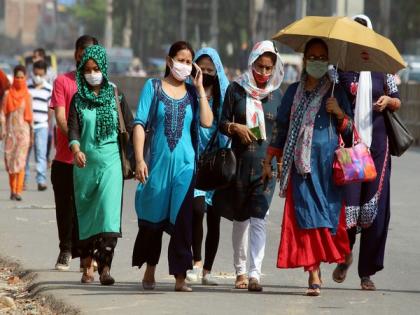COVID-19 majorly impacted women health, need planning and recovery efforts: PFI
By ANI | Published: July 11, 2020 01:40 AM2020-07-11T01:40:11+5:302020-07-11T01:55:07+5:30
While the coronavirus pandemic majorly impacted women's health, the Population Foundation of India (PFI) has recommended timely measures to ensure women and girls remain central to COVID-19 response planning and recovery efforts.

COVID-19 majorly impacted women health, need planning and recovery efforts: PFI
While the coronavirus pandemic majorly impacted women's health, the Population Foundation of India (PFI) has recommended timely measures to ensure women and girls remain central to COVID-19 response planning and recovery efforts.
In its policy paper, the national NGO takes a comprehensive look at the impact of the COVID-19 crisis on women and girls.
The authors relied on global evidence to understand the impact of COVID-19 on young people, girls and women and their access to health services.
According to estimates by the UNICEF, India would have the highest number of forecast births, at 20 million, in the nine months period dating from when COVID-19 was first declared a pandemic.
Commenting on the report, Poonam Muttreja, Executive Director, PFI said, "The COVID-19 crisis has placed unprecedented demands on our social services and health care system. Women are increasingly at greater risk of sexual and domestic violence, disruptions to their healthcare services, stock-outs of supplies of contraceptives and menstrual hygiene products and mental stress and anxiety."
"It is critical that we reassess our emergency response policies through a gender lens to improve planning and programming. It is also a testimony to PFI's strong commitment to women's reproductive and sexual health and rights that guides our research and programme commitment to COVID 19," she added.
"Given the evidence, we must apply a gender lens - using gender-disaggregated data and evidence to address programmes and policies around COVID-19. Also, increased investment in family planning is the most cost-effective public health measure," said Muttreja.
The recommendations say that invest in the 3.3 million female frontline health workers, who are the face of the Indian public health system and in many parts of the country the only health-care support.
Use social and behaviour change communication (SBCC) campaigns to spread information and awareness on COVID-19 and address myths and misconceptions.
There is a need for extra efforts to strengthen the public health system and increase health budgets to optimize service delivery and health facilities as well as maintain supply chains, it said.
Guttmacher Institute, a leading research and policy orgzation has projected that a 10 per cent decline in the use of reversible contraceptive methods in low and middle-income countries due to reduced access which would result in an additional 49 million women with an unmet need for modern contraceptives and an additional 15 million unintended pregnancies over the course of a year.
( With inputs from ANI )
Open in app